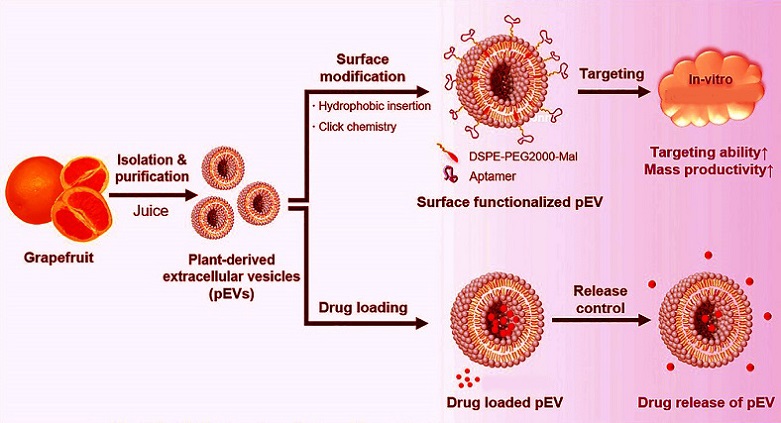Russian Scientist Turn to Grapefruit Vesicles to Transform Colon Cancer Treatment
Nikhil Prasad Fact checked by:Thailand Medical News Team Dec 08, 2024 4 months, 2 weeks, 4 days, 1 hour, 50 minutes ago
Medical News: Scientists from the St. Petersburg Nuclear Physics Institute of the National Research Centre “Kurchatov Institute” and the Institute of Cytology of the Russian Academy of Sciences have developed an innovative approach to boost antitumor immunity. They utilized grapefruit-derived vesicles (GEVs) as a delivery system for recombinant HSP70, a protein known for its ability to enhance the immune response against cancer cells. This
Medical News report discusses how this novel method can revolutionize treatment for colorectal cancer.
 Russian Scientist Turn to Grapefruit Vesicles to Transform Colon Cancer Treatment
Why HSP70 and Grapefruit Vesicles Matter
Russian Scientist Turn to Grapefruit Vesicles to Transform Colon Cancer Treatment
Why HSP70 and Grapefruit Vesicles Matter
HSP70 is a molecular chaperone that aids in antigen presentation, stimulating both innate and adaptive immunity. In free form, HSP70 has demonstrated its potential to increase tumor visibility to immune cells. However, delivering this protein efficiently and ensuring its stability have been challenging. Researchers turned to plant-derived vesicles - tiny particles secreted by plant cells. Grapefruit vesicles were chosen because they can encapsulate and protect HSP70, ensuring it retains its biological activity when delivered to human cells.
Using a technique that combined ultracentrifugation and sonication, researchers successfully loaded HSP70 into grapefruit vesicles. The resulting GEV-HSP70 formulation was tested in vitro on human and mouse colorectal cancer cell lines and in vivo using a mouse model.
Key Findings from the Study
The study's results were groundbreaking. When HSP70 was delivered as part of GEVs, the required dose was 20 times lower than that of free HSP70, yet it achieved the same immune activation. Here's what the researchers observed:
-Enhanced Immune Response: GEV-HSP70 significantly increased the sensitivity of cancer cells to natural killer (NK) cells and cytotoxic T lymphocytes. This enhanced immune response led to a notable reduction in tumor cell survival in vitro.
-Tumor Growth Inhibition: In mice injected with GEV-HSP70 alongside cancer cells, tumor growth was markedly slower compared to untreated mice. Tumors were smaller in size, and their weight was reduced by nearly half.
-Increased Lifespan: The treated mice showed a threefold increase in lifespan compared to control groups, with some surviving the entire 90-day observation period.
-Reduction in Pro-Tumor Cytokines: Blood tests revealed lower levels of TGFβ1 and IL-10, cytokines that often suppress immune responses and aid tumor progression.
-Activation of Specific Immune Cells: Mice treated with GEV-HSP70 showed a significant increase in the activity of CD8+ T cells, a type of immune cell crucial for targeting and destroying can
cer cells.
A Closer Look at the Mechanisms
The study explored why GEV-HSP70 was so effective. It turns out that the vesicles protect HSP70 from degradation and ensure its targeted delivery to tumor sites. This allows for more efficient uptake by cancer cells, which then become highly visible to the immune system. Unlike free HSP70, which can be quickly degraded, the encapsulated form persists longer in the body, giving immune cells ample time to mount a response.
Implications for Future Cancer Treatments
This approach has broad implications. By using natural, plant-derived vesicles, the method avoids ethical and manufacturing challenges associated with animal-derived delivery systems. The reduced dosage requirement also minimizes potential side effects, making treatments safer for patients.
Moreover, the ability of GEVs to deliver other therapeutic proteins opens the door for their use in treating various cancers and possibly other diseases. The study highlights the potential of combining natural carriers with cutting-edge molecular therapies.
Conclusions
The research showcases a novel, efficient, and natural method to activate antitumor immunity in colorectal cancer. Grapefruit vesicles loaded with HSP70 have proven to be a potent tool in reducing tumor growth, increasing survival rates, and enhancing immune responses in preclinical models. This technique, which uses 20 times less protein than traditional methods, could lead to safer, more effective cancer treatments in the future.
The study findings were published in the peer-reviewed journal: Biomedicines.
https://www.mdpi.com/2227-9059/12/12/2759
For the latest Cancer News, keep on logging to Thailand
Medical News.
Read Also:
https://www.thailandmedical.news/news/non-ionic-surfactant-vesicles-provide-new-hope-for-inflammation-treatment
https://www.thailandmedical.news/news/covid-19-study-links-extracellular-vesicles-to-severe-outcomes
https://www.thailandmedical.news/news/extracellular-histones-and-procoagulant-extracellular-vesicles-drive-the-prothrombotic-state-in-covid-19
